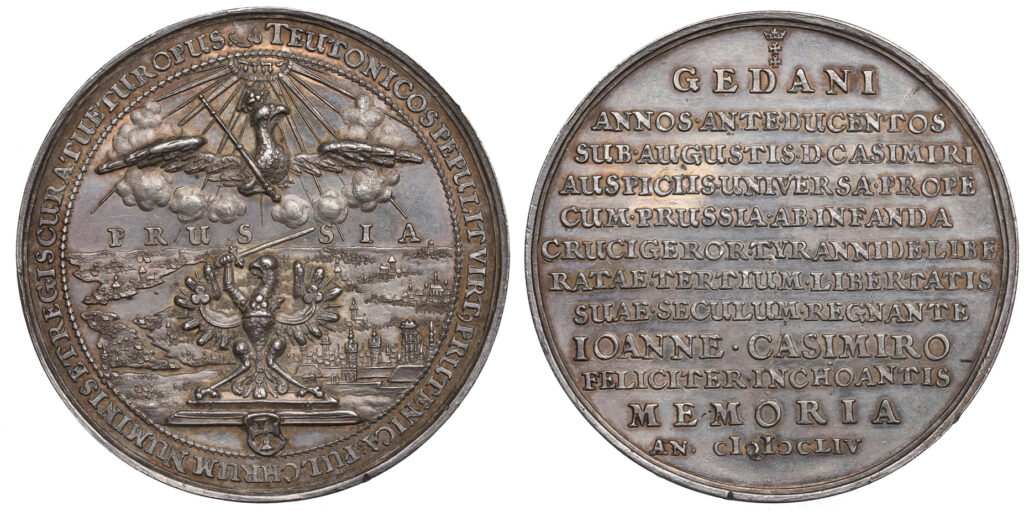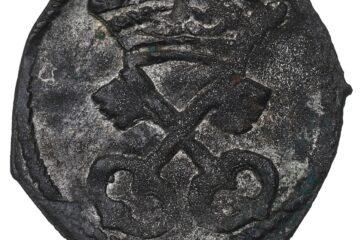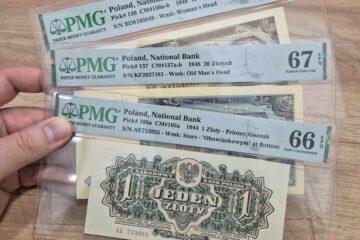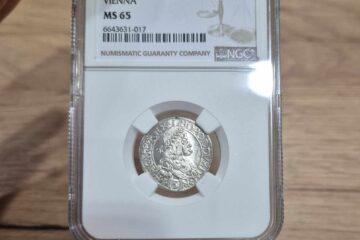At our Auction 15 – Medal minted in 1654 to commemorate the 200th anniversary of the incorporation of Prussia into Poland
After a short episode with the presentation of extremely interesting banknotes, we return to the medals that we will offer at our stationary auction in November. You really liked the medal commemorating the Peace of Oliwa in 1660. We hope that the same will be true of this equally exquisite medal by Jan Höhn, minted in 1654 to commemorate the 200th anniversary of the incorporation of Prussia into Poland. Typologically, the item itself is rare, and in such an excellent condition it is a real rarity.
When looking at this medal, we see the highest artistic craftsmanship and attention to the smallest details. The Gdańsk medal school in its purest form.
Obverse: a Prussian eagle with a sword in its right hand, on a pedestal with a coat of arms, in front of a vast plain covered with cities and cut by rivers. Above it there is an inscription: PRUSSIA; above, a second eagle, crowned, with spread wings, holding a scepter. Above it, the divine name written in Hebrew letters in rays. Legend around:
TEUTONICOS PEPULIT VIRTUS PRUTENICA PULCHRUM NUMINIS ET REGIS CURA TUETUR OPUS;
Reverse: coat of arms of Gdańsk above the legend in the lines:
GEDANI ANNOS ANTE DUCENTOS SUB AUGUSTIS D CASIMIRI AUSPICIIS UNIVERSA PROPE CUM PRUSSIA AB INFANDA CRUCIGEROR TYRANNIDE LIBERATAE TERTIUM LIBERTATIS SUAE SAECULUM, REGNANTE JOANNE CASMIRO FELICITER INCHOANTIS MEMORIA IN CIƆIƆCLIV;
Edward Raczyński writes about this medal and the circumstances of its issue:
“(…) This medal commemorates the annexation of Royal Prussia to Poland during the reign of Casimir IV Jagiellon.
Already in 1440, twenty important Prussian cities, including Königsberg, Gdańsk, Elbląg, Toruń, Braunsberg and Chełm, oppressed by the unpleasant yoke of the Teutonic Knights, formed a union against them. The Prussian nobility also joined this union, which the Grand Master Belisarius de Rusdorf, together with the more important Commanders of the order, approved. It is difficult today to guess what reasons the Grand Master could have had for initiating a rebellion against his authority. It is similar to the truth that, by giving in to difficult circumstances for a time, he did it in order to suppress a dangerous relationship later. Whatever the case, other dignitaries of the order rose up against the Grand Master’s submission and planned to remove him from office. The disputes of the Teutonic Knights among themselves, as well as the disputes between Prussian cities and the nobility with the government authorities, became more and more dangerous for the order, especially when, after the departure of Grand Master Rusdorf, his successor demanded that the cities pay homage. In vain did the Pope himself become an intermediary in this matter, in vain did both sides, seeking reconciliation, choose Frederick III the Emperor as their judge; irritated because their minds could not be calmed down. In 1454, Prussian cities and the nobility declared their obedience to the Teutonic Order and voluntarily submitted to Casimir IV Jagiellon, with the reservation of their rights and freedoms.
This medal was minted in Gdańsk to commemorate the two-century commemoration of the incorporation of Royal Prussia into Poland. In 1754, a second similar medal was minted for Augustus III. (From materials left by Bishop Albertrande.) (…)



